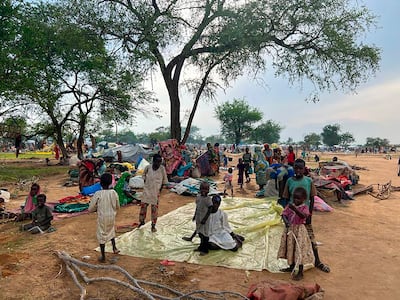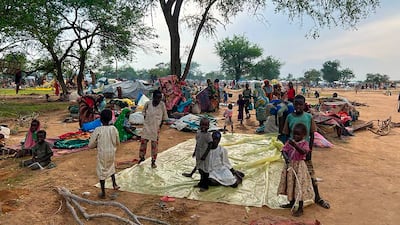Egypt will propose a three-month truce in Sudan when leaders of the conflict-torn nation's neighbours meet in Cairo on Thursday, according to Egyptian officials briefed on the plan.
The Egyptian proposal will include opening up safe corridors to deliver humanitarian aid to millions of people trapped by the fighting between Sudan's army and a rival paramilitary group in the capital and elsewhere in the vast Afro-Arab nation, the officials told The National.
Egypt on Sunday said the summit would look into the effects the nearly three-month-old conflict has had on Sudan's seven neighbours and seek to “put in place effective mechanisms to peacefully settle it in co-ordination with other regional and international tracks”.
It would also look at ways to contain the regional fallout from the war, according to the Egyptian presidential statement announcing the meeting.
The leaders of Egypt, Libya, Chad, the Central African Republic, South Sudan, Ethiopia and Eritrea are expected to attend the meeting.
Representatives of the African Union and the Arab League will also attend.
“Given the magnitude of its interests in Sudan, Egypt is late in assuming a leading role in diplomatic efforts aimed at ending the war, especially now that others already have tried and failed,” said Mohamed Anis Salem, a former career diplomat who is now with the Egyptian Council for Foreign Relations, a Cairo-based think tank.
“Egypt must closely watch what is going on in Sudan because the war there appears destined to fit a contemporary regional model of long-running conflicts. But efforts made to end the war, including the Cairo meeting, are uncoordinated and thus unlikely to be effective.”
Saudi Arabia and the US have mediated several ceasefires in Sudan, all of which have been breached by the warring sides: the army led by Gen Abdel Fattah Al Burhan and the paramilitary Rapid Support Forces led by Gen Mohamed Dagalo, his former ally and deputy.
The war broke out in mid-April following weeks of mounting tension over plans to reform the armed forces, including the assimilation of the RSF into the army and the withdrawal of the military from politics.

Thousands have been killed since the fighting began and the war has created a major humanitarian crisis. More than three million people have been displaced, including 700,000 who fled across the border, with Egypt, Chad, South Sudan and the Central African Republic the main recipients.
Millions are trapped in Khartoum, the epicentre of the conflict so far, enduring air strikes and shelling, lengthy power and water cuts, and scarce health services.
Egypt, Sudan's neighbour to the north, has to date received more than 250,000 refugees. They joined a resident Sudanese community estimated at four million.
Determined to fight
Despite the magnitude of the humanitarian crisis and the widespread destruction in Khartoum, Gen Al Burhan and Gen Dagalo appear determined to fight to the bitter end, with neither man showing an appetite for a peaceful resolution.
The UN last week said Sudan was moving towards a full-scale civil war. The US earlier said that neither the army nor the RSF have the political will to end the fighting.
The army this week boycotted a summit on Sudan held in Addis Ababa by the regional East African Intergovernmental Authority on Development, accusing Kenya, which led the meeting, of providing a haven for RSF forces.
The army-aligned foreign ministry also rejected the summit's proposals for a no-fly zone over Sudan, the withdrawal of heavy artillery and the dispatching of peacekeepers to protect civilians.

Any such force, said the ministry, would be treated as an enemy upon entering Sudan.
The army has been relying on air power and artillery to dislodge thousands of RSF fighters hunkered down deep in residential neighbourhoods in Khartoum, occupying homes and mostly surviving on looted food.
“The disrespect of IGAD towards the opinions of its member states will cause the Sudanese government to rethink the utility of its membership in the organisation,” the foreign ministry said.
Beside regional leaders, the IGAD summit featured US representatives who appeared to reject the prospect of future military rule in Sudan.
“Reaching a negotiated settlement does not – and cannot – mean returning to the status quo that existed before April 15,” said US ambassador John Godfrey.
Egypt's interest in Sudan's affairs cannot be overestimated.

The pair have been on-and-off allies for decades, with the larger Egypt traditionally viewing Sudan as part of its security sphere. Sudan controls the middle reaches of the Nile, on which Egypt depends for nearly all of its freshwater needs.
Cairo has always regarded Sudan's vast agricultural potential as a possible source of food for its growing population of 105 million, which is more than twice that of Sudan. The pair are also bound by centuries-old social, cultural and economic ties.
“It is not surprising that Egypt would like to take a more assertive role on Sudan, but I am not sure the Cairo gathering will change anything on the ground,” said Middle East expert Michael Hanna of the International Crisis Group.
“The combatants are not really interested in a ceasefire and it's an open question whether other key players in the region want Egypt to take the lead on seeking an end to Sudan war.”


